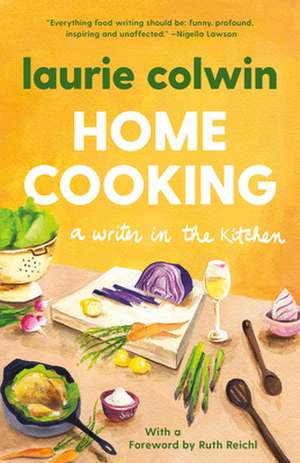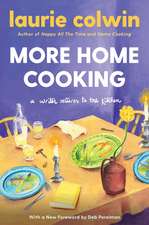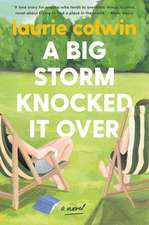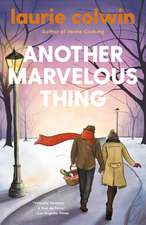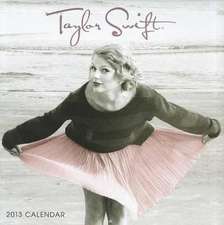Home Cooking: A Writer in the Kitchen
Autor Laurie Colwin Ilustrat de Anna Shapiroen Limba Engleză Paperback – 28 feb 2010
Vezi toate premiile Carte premiată
| Toate formatele și edițiile | Preț | Express |
|---|---|---|
| Paperback (2) | 78.45 lei 24-30 zile | +26.41 lei 4-10 zile |
| Penguin Books – 3 oct 2012 | 78.45 lei 24-30 zile | +26.41 lei 4-10 zile |
| Vintage Books USA – 28 feb 2010 | 96.33 lei 3-5 săpt. |
Preț: 96.33 lei
Nou
Puncte Express: 144
Preț estimativ în valută:
18.44€ • 20.04$ • 15.50£
18.44€ • 20.04$ • 15.50£
Carte disponibilă
Livrare economică 31 martie-14 aprilie
Preluare comenzi: 021 569.72.76
Specificații
ISBN-13: 9780307474414
ISBN-10: 0307474410
Pagini: 193
Dimensiuni: 131 x 204 x 16 mm
Greutate: 0.23 kg
Editura: Vintage Books USA
ISBN-10: 0307474410
Pagini: 193
Dimensiuni: 131 x 204 x 16 mm
Greutate: 0.23 kg
Editura: Vintage Books USA
Notă biografică
Laurie Colwin is the author of five novels—Happy All the Time; Family Happiness; Goodbye Without Leaving; A Big Storm Knocked It Over; and Shine On, Bright and Dangerous Object—three collections of short stories—Passion and Affect; The Lone Pilgrim; and Another Marvelous Thing—and two collections of essays, Home Cooking and More Home Cooking. Colwin died in 1992.
Extras
Starting Out in the Kitchen
Cooking is like anything else: some people have an inborn talent for it. Some become expert by practicing and some learn from books.
The best way to feel at ease in the kitchen is to learn at someone's knee. Years ago a child (usually a girl) would learn from her parent (usually her mother) by standing on a chair next to the stove and watching intently, or by wandering into the kitchen and begging to help. I was once given an amazing lunch by a young woman whose mother had been unable to boil water but was quite able to employ expensive Chinese help. Everyone should have the good fortune either to be Chinese or to be rich. Either way, you can end up learning how to make homemade won tons and duck stuffed with cherries and fresh lichee nuts.
For those who come to cooking late in life-by this I mean after the age of eighteen-many are the pitfalls in store. For instance, if you ask an experienced cook what dish is foolproof, scrambled eggs is often the answer. But the way toward perfect scrambled eggs is full of lumps. It is no easy thing to make perfect scrambled eggs, although almost anyone can turn' out fairly decent ones, and with a little work, really disgusting ones can be provided.
I was once romantically aligned with a young man who I now realize was crazy, but at the time he seemed . . . romantic. It was on the subject of scrambled eggs that I began to have my first suspicions. He claimed his scrambled eggs resembled one of those asbestos mats you put over the burner to diffuse the flame. I asked him what his method of making them was.
"Well," he said, "I mash them together-you know what I mean-and then I add whatever spice is around."
I asked him what was usually around. Mace, he said, and ground thyme. He produced two very old-looking tins. I did not understand why a person would want to have mace in his eggs or ground thyme, which tastes like a kind of bitter, powdered sawdust and is not good for anything unless you need weird green powder for a prop. Well, then what? I wanted to know.
"I heat up a little vegetable oil in a pan and go and take a shower. When I come back, I put in the eggs and then I go and shave. By the time I'm finished shaving, they're done."
This should have been enough to make me flee, but love, aside from being blind, is also often deaf.
The loveliest scrambled eggs I have ever had were given to me by a not crazy young man, an Englishman who insisted that scrambled eggs should be made in a double boiler. The result is a cross between a scrambled egg and a savory custard, and if you happen to have about forty minutes of free time some day it is certainly worth the effort.
You scramble the eggs and add a tablespoon of cream. You then put a lump of butter into the top of a double boiler and when it melts, add the eggs. Stir constantly, remembering to have your blood cholesterol checked at the soonest possible moment. Stir as in boiled custard until you feel either that your arm is going to falloff or that you are going to start to scream uncontrollably. It is wise to have someone you adore talking to in the kitchen while you make these eggs, or to be listening to something very compelling on the radio. If you have truly mastered the art of keeping a telephone under your chin without its falling to the floor, a telephone visit always makes the time go faster.
The resulting eggs are satiny and creamy and do not need anything at all, although if your palate is jaded, these eggs can be made with cheese. I would recommend this dish, known to me as English Scrambled Eggs (although no one else I have ever met in England has ever heard of them), only to supervised beginners.
Or take beef stew, that favorite of brownie and girl scout leaders for cooking projects. People are always messing it up, mostly men. A good cook I know was given something really awful by a fellow. It was stew all right, but the meat had the texture of jerky. She was curious and, after almost breaking a tooth, asked how he had achieved this strange leatherlike substance.
"The recipe said to saute until brown," said the fellow. "So I did."
"And how long did you do it for?" she asked. "Oh, an hour or so," he replied.
My own husband confessed to me that he was flummoxed by the instruction “Add liquid to cover." The result was a kind of gray water-rather like the gray-green, greasy Limpopo River in "The Elephant's Child" by Rudyard Kipling.
So much for the idea that if you can read you can cook.
Let's say you have never cooked a thing in your life but have made the mad, foolhardy gesture of inviting someone to dinner. Many years ago I worked with a girl whose fiance did not know that she was unable to cook. They had a very proper courtship-separate apartments, theater dates and so on. Once a week he came for dinner and she could be heard on the telephone confabulating with a place called Casserole Kitchen, or Casserole Cottage, which sent over a homely looking something or other and you sent back the empty pot. Years later I read her marriage announcement in the Times and wondered if Casserole Bungalow was still around or if she had learned to cook. More interesting, had she ever confessed to her husband?
Of course now that there is a fancy takeout shop on every corner, not knowing how to cook is no longer so problematic. My cousin's wife, a hardworking and elegant person, claimed for years that she did not apply heat to food, but she knew how to shop and, what is more, she knew where. Brunch at my cousin's is the only meal I have ever had at which everyone gets as much smoked salmon as they want.
My cousin's wife is an interesting case in point. She is an Italophile and decided that since she ought to learn to cook, Italian food was what she wanted to learn. She started rather simply with a combination of cooking and shopping. That is, she would apply heat to one dish and buy the rest. Little by little she has expanded her repertoire and it is now possible to get an amazingly good four-course dinner at her house.
One of her first attempts was lasagna, something notoriously difficult to concoct. Hers was a success, but she was in a state of nerves, which gives backbone to my theory that novices go for the elaborate.
The novice cook goes to the kitchen armed with a chinoise and a copy of Edwardian Glamour Cooking Without Tears in order to produce a lobster bisque made of pounded lobster shells, or invites a loved one for a dinner that begins with seviche and ends with a fruit souffle.
The fact is, those nice simple things-a grilled steak or lamb chops, boiled potatoes, and steamed string beans are quite formidable enough. The steak is either raw or grilled into shoe leather. The potatoes turn out crunchy in the center, never a good thing in a boiled potato, or mushy. The string beans are either underdone or they are overdone and have turned a limp olive green.
So what is the novice, quivering with anxiety and expecting some nice person to turn up hungry in a number of hours, to do? The novice should try some fairly easy dish that requires long cooking. The novice should consult several recipes and read them over a few times until he or she has gotten the parts straight in his or her mind. And the novice should call up the best cook he or she knows and listen to what that person says. And then the novice should stick to it.
I had a friend whose experience in the kitchen centered around opening cans of Irish potatoes and putting a hamburger into a pan while the frozen French-cut string beans were boiling. She got engaged to a very sociable fellow who liked to entertain, and she needed a party dish. I gave her my tried and true recipe for chili (which I got from the best cook I know) and explained every detail carefully. This is why a friend beats a cookbook hands down: you can't cross examine a cookbook.
The day after the dinner party she called to say that the chili was kind of weird.
"Weird?" I said. "How could it be weird?"
"Well," she said, "as I was putting it together this guy called. He lives in Nebraska and I used to go out with him. He told me that he always put some cinnamon and turmeric in his chili, so I did."
My lessons in cooking came from my mother, a wonderful cook who makes, among other things, a savory, never-fail straightforward beef stew. As you gather courage, after cooking it a dozen times, you can begin to experiment and refine your technique. In no time at all you will be making true daube cooked between two sheets of pork rind with a calf's foot thrown in, but that is for later. This is for now.
Extremely Easy Old-Fashioned Beef Stew
1. For two people I suggest two and a half pounds of stewing beef, which will provide leftovers. Have the butcher cut the beef into cubes. After a while you will do this yourself to get the exact size you want.
2. Put one cup of white flour into a paper bag with two tablespoons of paprika and three or four twists of the pepper grinder. Shake gently. Beef stew does not require salt.
3. Put half the cubes in the bag, shake, remove with your hands or a slotted spoon, and then add the rest and shake.
4. Heat about 1/4 cup of olive oil in a skillet, turn down the flame, and fry the meat gently until the flour begins to turn color. It does not have to be evenly done. The true purpose of this is to add color and depth to the sauce.
5. Put half the meat into a deep casserole and sprinkle with two cloves of chopped garlic. Add one carrot scraped and cut into chunks, one onion quartered (one quarter stuck with two cloves), and one medium Idaho potato peeled or unpeeled, as you like, also cut in chunks. Add the rest of the browned meat, another carrot, onion, potato and another clove of chopped garlic.
6. Into the skillet pour one cup of red wine, stir in one four-ounce can of tomato sauce and two tablespoons of tomato paste. Cook down, stirring all the time (about four minutes), take off the fire and pour over the meat.
7. Cover the casserole and cook at 300 degrees for at least three hours. You can put this in the oven and go about your business. Cook for the last fifteen minutes with the cover off.
You serve this with noodles, for which you follow the directions on the package. You can serve these noodles with butter, or with olive oil, or with grated cheese and chopped scallion.
As to the rest of the meal, it is simply too draining for a first-timer to provide everything. A salad requires only a bunch of watercress, some oil and vinegar, salt and pepper. If you have your heart set on baking a cake, invite friends in for dessert only and forget dinner. Step by step is the motto here.
And as every cook knows, and every cook was once a novice of some sort or another, you can always experiment on yourself and your loved ones.
Keep in mind that you should always apologize and never explain and that if the ultimate in horror takes place, there is one sure remedy.
Once upon a time some old friends of my husband's came for dinner. I had never met these people, and I had also never cooked those dry, filled tortellini you find in packages in Italian food shops. I have come to realize that these are meant for soup-or they ought to be--but I cooked a large pot of them and we all sat down.
It is a strange feeling to have pasta first crunch and then stick to your teeth, no matter how nice the sauce is. My husband and I exchanged glances. His friends, it was clear, had smoked a considerable amount of marijuana before coming to us, but even they noticed that something was funny.
"Hey," said one of these friends, "wouldn't it be groovy if we could dump this whatever it is in the garbage and go out for dinner?"
So that is what we did. If all else fails, eat out, and while you are smiling through your tears, remember that novices usually make the same terrible mistake only once.
Cooking is like anything else: some people have an inborn talent for it. Some become expert by practicing and some learn from books.
The best way to feel at ease in the kitchen is to learn at someone's knee. Years ago a child (usually a girl) would learn from her parent (usually her mother) by standing on a chair next to the stove and watching intently, or by wandering into the kitchen and begging to help. I was once given an amazing lunch by a young woman whose mother had been unable to boil water but was quite able to employ expensive Chinese help. Everyone should have the good fortune either to be Chinese or to be rich. Either way, you can end up learning how to make homemade won tons and duck stuffed with cherries and fresh lichee nuts.
For those who come to cooking late in life-by this I mean after the age of eighteen-many are the pitfalls in store. For instance, if you ask an experienced cook what dish is foolproof, scrambled eggs is often the answer. But the way toward perfect scrambled eggs is full of lumps. It is no easy thing to make perfect scrambled eggs, although almost anyone can turn' out fairly decent ones, and with a little work, really disgusting ones can be provided.
I was once romantically aligned with a young man who I now realize was crazy, but at the time he seemed . . . romantic. It was on the subject of scrambled eggs that I began to have my first suspicions. He claimed his scrambled eggs resembled one of those asbestos mats you put over the burner to diffuse the flame. I asked him what his method of making them was.
"Well," he said, "I mash them together-you know what I mean-and then I add whatever spice is around."
I asked him what was usually around. Mace, he said, and ground thyme. He produced two very old-looking tins. I did not understand why a person would want to have mace in his eggs or ground thyme, which tastes like a kind of bitter, powdered sawdust and is not good for anything unless you need weird green powder for a prop. Well, then what? I wanted to know.
"I heat up a little vegetable oil in a pan and go and take a shower. When I come back, I put in the eggs and then I go and shave. By the time I'm finished shaving, they're done."
This should have been enough to make me flee, but love, aside from being blind, is also often deaf.
The loveliest scrambled eggs I have ever had were given to me by a not crazy young man, an Englishman who insisted that scrambled eggs should be made in a double boiler. The result is a cross between a scrambled egg and a savory custard, and if you happen to have about forty minutes of free time some day it is certainly worth the effort.
You scramble the eggs and add a tablespoon of cream. You then put a lump of butter into the top of a double boiler and when it melts, add the eggs. Stir constantly, remembering to have your blood cholesterol checked at the soonest possible moment. Stir as in boiled custard until you feel either that your arm is going to falloff or that you are going to start to scream uncontrollably. It is wise to have someone you adore talking to in the kitchen while you make these eggs, or to be listening to something very compelling on the radio. If you have truly mastered the art of keeping a telephone under your chin without its falling to the floor, a telephone visit always makes the time go faster.
The resulting eggs are satiny and creamy and do not need anything at all, although if your palate is jaded, these eggs can be made with cheese. I would recommend this dish, known to me as English Scrambled Eggs (although no one else I have ever met in England has ever heard of them), only to supervised beginners.
Or take beef stew, that favorite of brownie and girl scout leaders for cooking projects. People are always messing it up, mostly men. A good cook I know was given something really awful by a fellow. It was stew all right, but the meat had the texture of jerky. She was curious and, after almost breaking a tooth, asked how he had achieved this strange leatherlike substance.
"The recipe said to saute until brown," said the fellow. "So I did."
"And how long did you do it for?" she asked. "Oh, an hour or so," he replied.
My own husband confessed to me that he was flummoxed by the instruction “Add liquid to cover." The result was a kind of gray water-rather like the gray-green, greasy Limpopo River in "The Elephant's Child" by Rudyard Kipling.
So much for the idea that if you can read you can cook.
Let's say you have never cooked a thing in your life but have made the mad, foolhardy gesture of inviting someone to dinner. Many years ago I worked with a girl whose fiance did not know that she was unable to cook. They had a very proper courtship-separate apartments, theater dates and so on. Once a week he came for dinner and she could be heard on the telephone confabulating with a place called Casserole Kitchen, or Casserole Cottage, which sent over a homely looking something or other and you sent back the empty pot. Years later I read her marriage announcement in the Times and wondered if Casserole Bungalow was still around or if she had learned to cook. More interesting, had she ever confessed to her husband?
Of course now that there is a fancy takeout shop on every corner, not knowing how to cook is no longer so problematic. My cousin's wife, a hardworking and elegant person, claimed for years that she did not apply heat to food, but she knew how to shop and, what is more, she knew where. Brunch at my cousin's is the only meal I have ever had at which everyone gets as much smoked salmon as they want.
My cousin's wife is an interesting case in point. She is an Italophile and decided that since she ought to learn to cook, Italian food was what she wanted to learn. She started rather simply with a combination of cooking and shopping. That is, she would apply heat to one dish and buy the rest. Little by little she has expanded her repertoire and it is now possible to get an amazingly good four-course dinner at her house.
One of her first attempts was lasagna, something notoriously difficult to concoct. Hers was a success, but she was in a state of nerves, which gives backbone to my theory that novices go for the elaborate.
The novice cook goes to the kitchen armed with a chinoise and a copy of Edwardian Glamour Cooking Without Tears in order to produce a lobster bisque made of pounded lobster shells, or invites a loved one for a dinner that begins with seviche and ends with a fruit souffle.
The fact is, those nice simple things-a grilled steak or lamb chops, boiled potatoes, and steamed string beans are quite formidable enough. The steak is either raw or grilled into shoe leather. The potatoes turn out crunchy in the center, never a good thing in a boiled potato, or mushy. The string beans are either underdone or they are overdone and have turned a limp olive green.
So what is the novice, quivering with anxiety and expecting some nice person to turn up hungry in a number of hours, to do? The novice should try some fairly easy dish that requires long cooking. The novice should consult several recipes and read them over a few times until he or she has gotten the parts straight in his or her mind. And the novice should call up the best cook he or she knows and listen to what that person says. And then the novice should stick to it.
I had a friend whose experience in the kitchen centered around opening cans of Irish potatoes and putting a hamburger into a pan while the frozen French-cut string beans were boiling. She got engaged to a very sociable fellow who liked to entertain, and she needed a party dish. I gave her my tried and true recipe for chili (which I got from the best cook I know) and explained every detail carefully. This is why a friend beats a cookbook hands down: you can't cross examine a cookbook.
The day after the dinner party she called to say that the chili was kind of weird.
"Weird?" I said. "How could it be weird?"
"Well," she said, "as I was putting it together this guy called. He lives in Nebraska and I used to go out with him. He told me that he always put some cinnamon and turmeric in his chili, so I did."
My lessons in cooking came from my mother, a wonderful cook who makes, among other things, a savory, never-fail straightforward beef stew. As you gather courage, after cooking it a dozen times, you can begin to experiment and refine your technique. In no time at all you will be making true daube cooked between two sheets of pork rind with a calf's foot thrown in, but that is for later. This is for now.
Extremely Easy Old-Fashioned Beef Stew
1. For two people I suggest two and a half pounds of stewing beef, which will provide leftovers. Have the butcher cut the beef into cubes. After a while you will do this yourself to get the exact size you want.
2. Put one cup of white flour into a paper bag with two tablespoons of paprika and three or four twists of the pepper grinder. Shake gently. Beef stew does not require salt.
3. Put half the cubes in the bag, shake, remove with your hands or a slotted spoon, and then add the rest and shake.
4. Heat about 1/4 cup of olive oil in a skillet, turn down the flame, and fry the meat gently until the flour begins to turn color. It does not have to be evenly done. The true purpose of this is to add color and depth to the sauce.
5. Put half the meat into a deep casserole and sprinkle with two cloves of chopped garlic. Add one carrot scraped and cut into chunks, one onion quartered (one quarter stuck with two cloves), and one medium Idaho potato peeled or unpeeled, as you like, also cut in chunks. Add the rest of the browned meat, another carrot, onion, potato and another clove of chopped garlic.
6. Into the skillet pour one cup of red wine, stir in one four-ounce can of tomato sauce and two tablespoons of tomato paste. Cook down, stirring all the time (about four minutes), take off the fire and pour over the meat.
7. Cover the casserole and cook at 300 degrees for at least three hours. You can put this in the oven and go about your business. Cook for the last fifteen minutes with the cover off.
You serve this with noodles, for which you follow the directions on the package. You can serve these noodles with butter, or with olive oil, or with grated cheese and chopped scallion.
As to the rest of the meal, it is simply too draining for a first-timer to provide everything. A salad requires only a bunch of watercress, some oil and vinegar, salt and pepper. If you have your heart set on baking a cake, invite friends in for dessert only and forget dinner. Step by step is the motto here.
And as every cook knows, and every cook was once a novice of some sort or another, you can always experiment on yourself and your loved ones.
Keep in mind that you should always apologize and never explain and that if the ultimate in horror takes place, there is one sure remedy.
Once upon a time some old friends of my husband's came for dinner. I had never met these people, and I had also never cooked those dry, filled tortellini you find in packages in Italian food shops. I have come to realize that these are meant for soup-or they ought to be--but I cooked a large pot of them and we all sat down.
It is a strange feeling to have pasta first crunch and then stick to your teeth, no matter how nice the sauce is. My husband and I exchanged glances. His friends, it was clear, had smoked a considerable amount of marijuana before coming to us, but even they noticed that something was funny.
"Hey," said one of these friends, "wouldn't it be groovy if we could dump this whatever it is in the garbage and go out for dinner?"
So that is what we did. If all else fails, eat out, and while you are smiling through your tears, remember that novices usually make the same terrible mistake only once.
Recenzii
“As much memoir as cookbook and as much about eating as cooking.” —The New York Times Book Review
“The one true kitchen friend." —The Washington Post
“Celebrates a life devoted to food, with chapters on how to cook a meal for several hundred people, how to prepare a gourmet dinner with eggplant in your bathtub, and how to make the best fried chicken in the world.” —Santa Fe New Mexican
“Laurie Colwin's food thoughts are like phone calls from a dear friend.” —The New York Times
“A delightful tribute to food, friends and kitchen memories.... This charmer is as irresistible as homemade shortbread.” —San Diego Union-Tribune
“A very funny book. Funny enough to make you giggle out loud.” —Newsday
“[Laurie Colwin] is a home cook, like you and me, whose charm and lack of pretension make her wonderfully human and a welcome companion.” —Chicago Tribune
“I decided to lean back and trust Ms. Colwin when she revealed that ‘I am never on a diet regime I cannot be talked out of.’” —Ann Banks, The New York Times Book Review
“Delightful. . . . [Colwin] is funny, and for some reason funny stories about food are as funny as things can get.” —St. Petersburg Times
“Cozy, unpretentious good sense . . . characterizes all her food writing.” —The New York Times
“I have in my kitchen a book called Home Cooking. And, in between following the recipes for Extremely Easy Beef Stew, or Estelle Colwin Snellenberg’s Potato Pancakes, I would frequently sit down on a little stool in my kitchen and read through one of the essays in that book. I never read through The Joy of Cooking, and I can read the Silver Palate Cookbook standing up, but I always sat down to read these.” —Anna Quindlen
“Laurie Colwin is both sensible and sensitive when writing about food, and [her] prose makes me laugh, cry and feel hungry all at the same time.” —The Baltimore Sun
“Reading the essays of Laurie Colwin is a bit like eating comfort food: warm, familiar and good for the soul.” —Hartford Courant
“A warm, personal remembrance of the foods Colwin ate as a child and later served to friends and family.” —Seattle Post-Intelligencer
“[Colwin] is a beacon of hope. For beginning cooks, Home Cooking is a grand consciousness and/or confidence-raiser.” —The Oregonian
“Like a classic dish, [Colwin’s] writing is magic in its simplicity.” —Charlotte Observer
“Wry and funny.” —Dallas Morning News
“Charming and humorous.” —USA Today
“Enthralling, but all too short. The only thing to do [is] reread it. And then turn to her novels.” —Buffalo News
“The one true kitchen friend." —The Washington Post
“Celebrates a life devoted to food, with chapters on how to cook a meal for several hundred people, how to prepare a gourmet dinner with eggplant in your bathtub, and how to make the best fried chicken in the world.” —Santa Fe New Mexican
“Laurie Colwin's food thoughts are like phone calls from a dear friend.” —The New York Times
“A delightful tribute to food, friends and kitchen memories.... This charmer is as irresistible as homemade shortbread.” —San Diego Union-Tribune
“A very funny book. Funny enough to make you giggle out loud.” —Newsday
“[Laurie Colwin] is a home cook, like you and me, whose charm and lack of pretension make her wonderfully human and a welcome companion.” —Chicago Tribune
“I decided to lean back and trust Ms. Colwin when she revealed that ‘I am never on a diet regime I cannot be talked out of.’” —Ann Banks, The New York Times Book Review
“Delightful. . . . [Colwin] is funny, and for some reason funny stories about food are as funny as things can get.” —St. Petersburg Times
“Cozy, unpretentious good sense . . . characterizes all her food writing.” —The New York Times
“I have in my kitchen a book called Home Cooking. And, in between following the recipes for Extremely Easy Beef Stew, or Estelle Colwin Snellenberg’s Potato Pancakes, I would frequently sit down on a little stool in my kitchen and read through one of the essays in that book. I never read through The Joy of Cooking, and I can read the Silver Palate Cookbook standing up, but I always sat down to read these.” —Anna Quindlen
“Laurie Colwin is both sensible and sensitive when writing about food, and [her] prose makes me laugh, cry and feel hungry all at the same time.” —The Baltimore Sun
“Reading the essays of Laurie Colwin is a bit like eating comfort food: warm, familiar and good for the soul.” —Hartford Courant
“A warm, personal remembrance of the foods Colwin ate as a child and later served to friends and family.” —Seattle Post-Intelligencer
“[Colwin] is a beacon of hope. For beginning cooks, Home Cooking is a grand consciousness and/or confidence-raiser.” —The Oregonian
“Like a classic dish, [Colwin’s] writing is magic in its simplicity.” —Charlotte Observer
“Wry and funny.” —Dallas Morning News
“Charming and humorous.” —USA Today
“Enthralling, but all too short. The only thing to do [is] reread it. And then turn to her novels.” —Buffalo News
Cuprins
Foreward
Home Cooking: An Introduction
Starting Out in the Kitchen
The Low-Tech Person's Batterie de Cuisine
Alone in the Kitchen with an Eggplant
How to Fry Chicken
Potato Salad
Feeding the Fussy
Bread Baking Without Agony
Friday Night Supper
How to Disguise Vegetables
Fish
Feeding the Multitudes
Chocolate
The Same Old Thing
Red Peppers
Dinner Parties
How to Avoid Grilling
Nursery Food
Bitter Greens
Soup
English Food
Without Salt
Stuffing: A Confession
Flank Steak: The Neglected Cut
Kitchen Horrors
About Salad
Repulsive Dinners: A Memoir
Chicken Salad
Easy Cooking for Exhausted People
How to Give a Party
How to Make Gingerbread
Stuffed Breast of Veal: A Bad Idea
Black Cake
Index
Home Cooking: An Introduction
Starting Out in the Kitchen
The Low-Tech Person's Batterie de Cuisine
Alone in the Kitchen with an Eggplant
How to Fry Chicken
Potato Salad
Feeding the Fussy
Bread Baking Without Agony
Friday Night Supper
How to Disguise Vegetables
Fish
Feeding the Multitudes
Chocolate
The Same Old Thing
Red Peppers
Dinner Parties
How to Avoid Grilling
Nursery Food
Bitter Greens
Soup
English Food
Without Salt
Stuffing: A Confession
Flank Steak: The Neglected Cut
Kitchen Horrors
About Salad
Repulsive Dinners: A Memoir
Chicken Salad
Easy Cooking for Exhausted People
How to Give a Party
How to Make Gingerbread
Stuffed Breast of Veal: A Bad Idea
Black Cake
Index
Descriere
A unique feast for body and soul, "Home Cooking" shares the delightful pleasures of discovering cooking and eating good, simple food.
Premii
- James Beard Foundation Book Awards Winner, 2012
